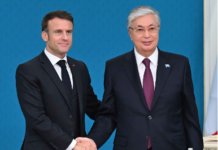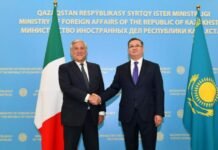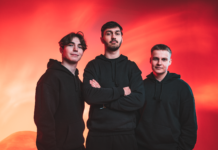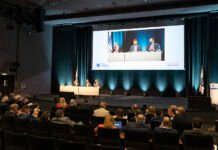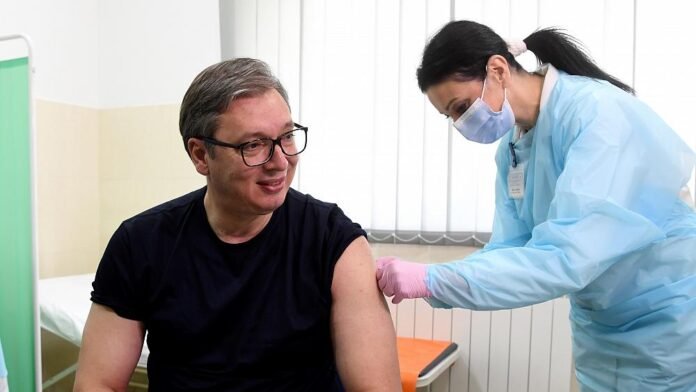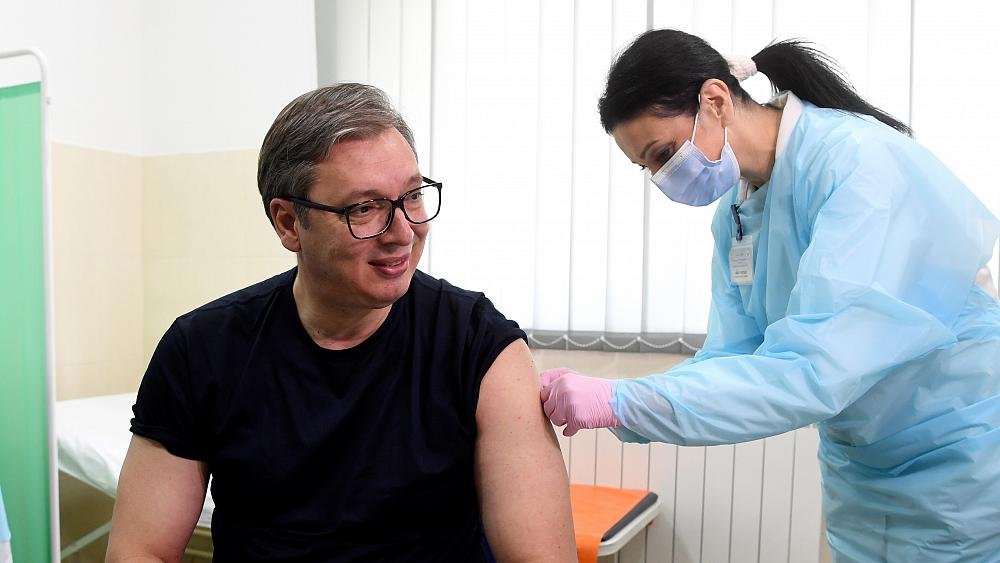
On the last weekend of March, Ena Jazic Surkovic set off to Serbia from Sarajevo in Bosnia and Herzegovina (BiH), with one goal – to get a coronavirus vaccination.
She was just one of tens of thousands who journeyed to Serbia, with people from neighbouring Croatia, North Macedonia, Montenegro and Albania also making the trip to the small Western Balkan country on the outskirts of the EU.
Within days they were vaccinated against COVID-19, thanks to Serbia and the jabs the country had managed to purchase – a strange outlier at a time when countries are desperately trying to get hold of vaccines for their populations.
“I chose life, this vaccine means life to me,” Surkovic told Euronews.
“I am grateful to the citizens of Serbia, whose money bought the vaccine, for allowing their neighbours to get vaccinated, neighbours who do not have enough jabs at the moment.”
Serbia races ahead in global vaccination race
While Surkovic awaits her second dose of the vaccine, which she will also receive in Serbia, the vaccination process there continues to fascinate many larger and more powerful states, such as those in the EU.
Serbia, with a population of around 7 million, has so far acquired more than 3.5 million vaccines from four different manufacturers, including from China and Russia. It has performed just under 2.5 million immunisations, with around 1 million people receiving both doses.
It has already donated vaccines to neighbouring countries in the Western Balkans but is now inviting neighbouring citizens to cross its border to receive vaccinations.
A total of 22,610 foreigners received their vaccine in Serbian cities at the end of March, at the invitation of the Serbian Chamber of Commerce, or they signed up themselves through the Serbian government’s e-government portal. There were those who turned up without an appointment.
Questions have been raised as to why Serbia decided to do this.
With countries such as Russia and China engaged in so-called vaccine diplomacy, could this also be Serbia’s game?
“There is no politics in vaccination,” Serbia’s prime minister Ana Brnabić told Euronews.
“The most beautiful image of solidarity was sent from Serbia by vaccinating citizens of other states. There was no politics in the invitation to come, nor was there any politics in them coming to our country. They trusted us and I wish to thank them,” she added.
There have also been suggestions that the vaccines were going to expire – something Brnabic doesn’t deny.
With some 20,000-25,000 doses of AstraZeneca’s vaccine set to pass their best before date, Brnabic said Serbia does not want to “throw vaccines away” at a time of global shortage.
Whatever Serbia’s reasoning, people like Surkovic are feeling grateful.
She told Euronews she applied as soon as she heard Vucic’s announcement and headed over with her husband and cousin.
“We returned to Sarajevo psychologically relieved because we know that even if we get infected it will not be so bad, with serious complications,” she said.
Asked about the possibility the vaccine she was given was about to expire, she says with a smile that she would take it even if it had expired on the day of vaccination because she knows it is effective.
“This is a mutual benefit for Serbia and for the people of the region. It would cost a lot to destroy vaccines, and on the other hand, it means life to us. Solidarity at times like this is important. I am grateful to the citizens of Serbia because the vaccine was purchased with their money. As to who has decided whether the region will be able to be vaccinated, that is politics,” she said.
Dobrila Mocevic, also from BiH, is grateful too. She says she feels calmer after the vaccination, but that wearing the mask, keeping physical distance, disinfecting one’s hands remains.
How Serbia’s rollout for neighbours worked
The Director of the Serbian Government’s IT and e-Government Office, Mihajlo Jovanovic, told Euronews in just one day 11,030 foreigners were vaccinated at checkpoints in Belgrade, Niš, and Novi Sad.
“We sent 20,000 calls for vaccination to foreigners with scheduled appointments, but we accepted about 2,600 more people who came without an appointment. We didn’t want to turn anyone down. These were mostly citizens of Northern Macedonia,” Jovanovic said.
In addition to vaccinating foreigners, 28,000 Serbian citizens were vaccinated in three days. All vaccines that received the “green light” from Serbia’s Medicines and Medical Devices Agency – Pfizer/BioNTech, AstraZeneca, Russia’s Sputnik V and China’s Sinofarm – were available to them.
Jovanovic says foreigners can still register through the e-Government vaccination portal in Serbia, but there will be no vaccination until they receive the invitation.
In addition to ordinary citizens, the business community has been vaccinated in Serbia. Marko Mandic, Head of the CCIS Center for the Western Balkans Six Chamber Investment Forum, told Euronews that about 8,500 businesspersons from the region have been vaccinated through that organisation.
He explained that the centre consists of chambers of commerce from Northern Macedonia, Montenegro, BiH, Albania and Kosovo.
“Through these partner chambers, we organised the application process. The Kosovo Chamber of Commerce, which is our partner, has decided not to participate in this activity. With the other partners, we organised the application and there were just over 8,500 interested people”, Mandic said.
The applications have continued to arrive, he says, and the interested parties are waiting for the Serbian government for the next step.
“We do not yet know whether this action will be allowed to be repeated. But certainly all our partners have kept a record of who addressed them and there is still a lot of interest.”
He says the CCIS has been advocating for the merging of the entire Western Balkans into a single economic market for years, with four freedoms – freedom of movement, goods, capital, and services.
He also explains that all foreign nationals, just like Serbian citizens, have received a bilingual confirmation of the first dose of the vaccine received (in Serbian and English), which also has a QR code. Using that code, he said, it is possible to check when they were vaccinated, and which jab they got.
In gratitude to Serbia, Macedonian Prime Minister Zoran Zaev announced the possibility that Serbian citizens would not pay tolls in their country during the summer.
